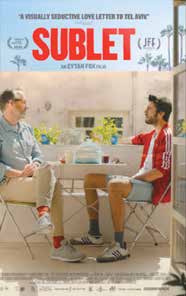
By Gary M. Kramer–
Out gay filmmaker Eytan Fox’s poignant dramady Sublet, now out on DVD, has The New York Times travel writer Michael (John Benjamin Hickey) arriving in Tel Aviv on assignment “to write about the city as it is.” He sublets an apartment from Tomer (Niv Nissim), a student who makes “artistic horror” films.
As Michael settles in to soak up the city, he allows Tomer to stay and act as his guide. While they come to know each other over five days, the very different men exchange impassioned thoughts about monogamy (Michael appreciates it, Tomer resists it); musicals (Michael loves them, Tomer loathes them); and even attitudes about Germany (Michael reflects on the history, whereas Tomer sees a new opportunity).
But Sublet is best when Michael gets out of his comfort zone. This happens a few times, yet it is most affecting during a meal at a Kibbutz with Tomer’s mother (Miki Kam). Hickey gives a wonderfully understated performance, while screen newcomer Niv Nissim exudes charisma.

Fox chatted about the film with me for the San Francisco Bay Times in a post-screening conversation last November. Here are excerpts from that conversation.
Gary M. Kramer: Many of your films put contrasting characters together. What decisions did you make regarding Michael and Tomer and their characteristics?
Eytan Fox: It makes good drama when you put together two seemingly different characters. When I started working on Sublet, I turned fifty. I’m not a young man anymore. I wanted to examine and understand that. So, I thought the best way to do that was to put me together with a young man who is from a different generation, a different world. [Tomer] is a gay, Israeli young man, 25, and very different from [Michael], a 50-year-old gay Israeli man. That would be an interesting way for me to examine who I am, what issues I care about, and to redefine who I am as a man and as a filmmaker. I put “me” [Michael] opposite a young man who is not me anymore and see what happens.
Gary M. Kramer: And what did you learn about yourself doing that?
Eytan Fox: Well … that I’m not 25 anymore. [Laughs] And I’m kind of happy not being 25 anymore. And there is a lot to learn from the younger generation, but there is also a lot to teach them. I tried to be nonjudgmental but also to say I have all this wisdom and history and I can introduce these things to you and teach you. This meeting of ideas and energies.
Gary M. Kramer: Speaking of which, who do you see having the power in the relationship between Tomer and Michael? They both see something they want in the other—it shifts back and forth over the course of the film—but who is in control?
Eytan Fox: You are right to say it shifts throughout the film. Michael is the father to Tomer, and at some points, Tomer is a father to Michael. Relationships are complicated. People take roles and reverse roles, and dynamics change.
Gary M. Kramer: On that same point, let’s talk about sex. What were your thoughts about the sexual nature of these two characters and their relationship, which is not a full-blown romance despite some affection between the men?
Eytan Fox: Relationships are complicated and layered. Sex comes in and is part of our relationships. It’s where I think physical and emotional [connections] come together. Tomer has many encounters that are only physical, but he doesn’t know how to connect the emotional with the physical. This may be the first time in his life they come together, which is why it [is] so powerful and strong, and meaningful.

Gary M. Kramer: Sublet features writers and books, film scenes, an art gallery, a museum, dance, food, and music. What can you say about incorporating all this Israeli culture in the film? Tomer and Michael could have bonded over anything, but you resist tourism—despite Michael’s job—for something that has more of a personal connection for the characters. Can you discuss this?
Eytan Fox: I try in all my films, but even more specifically in Sublet, to be as close as possible to my world. So, culture—dance, theater, books, galleries, museums, food—are very much a part of my life and life in Tel Aviv. I wanted to incorporate that in the film That’s what people do when they travel abroad; you get to do all these things. The film gives you the opportunity to experience all these things.
© 2021 Gary M. Kramer
Gary M. Kramer is the author of “Independent Queer Cinema: Reviews and Interviews,” and the co-editor of “Directory of World Cinema: Argentina.” Follow him on Twitter @garymkramer
Published on July 15, 2021
Recent Comments